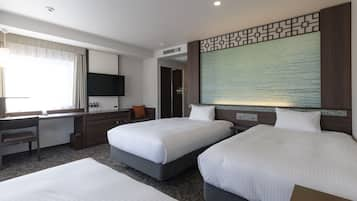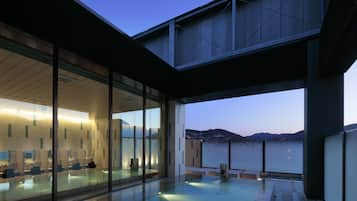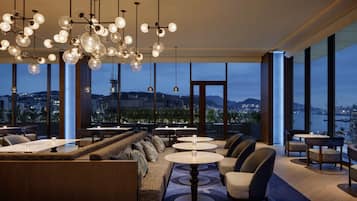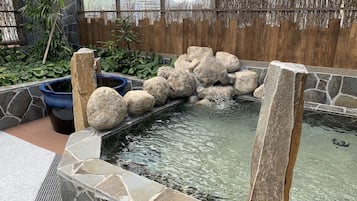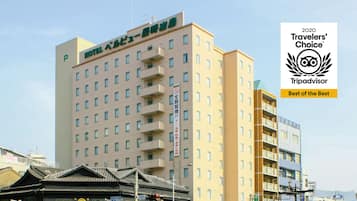The best things to do in Nagasaki range from fun island getaways to one of the superb 'Three Major Night Views of Japan'. There’s more to this city, one of the largest on Kyushu island, beyond memorials of the infamous WWII event, with charming sites featuring a blend of western and eastern elements.
Stroll through Japan’s oldest Chinatown or down quaint sloping neighbourhood streets that hark back to the days when Nagasaki served as a Dutch trading post. You can also have your fortunes told at a beautiful 17th-century Shinto shrine. Read on for more of Nagasaki’s coolest places to check out during your visit.
What are the best things to do in Nagasaki?
- 1
Nagasaki Peace Park
A vast and serene city park on ground zero

- Budget
- Families
- History
- Photo
Peace Park is Nagasaki’s tranquil public garden dedicated to the estimated 150,000 victims of the atomic bomb that detonated above the city in 1945. The park was built a decade after, with most of its space occupying a low-lying hill north of the hypocentre.
At the northern end of the park stands the focal, 10-metre-tall Peace Statue and the Fountain of Peace. The small square between them hosts the Peace Memorial Ceremony, held on August 9 every year. At Hypocenter Park across the street, you’ll find the ruins of the old Urakami Cathedral walls and a bunker-like display preserving the original ground level from 1945.
Location: 9 Matsuyamamachi, Nagasaki, 852-8118, Japan
Phone: +81 (0)9-58291164
Map - 2
Nagasaki Shinchi Chinatown
Japan’s oldest Chinatown

- Families
- Food
- Group
- History
- Photo
- Shoppers
Nagasaki Shinchi Chinatown, or simply Nagasaki Chinatown, is the centrepiece of the city’s colourful Shinchimachi shopping strip. Believed to be one of the oldest Chinatowns in Japan, Shinchi Chinatown stretches for only 250 metres but is packed with family-run ramen joints, clothing stores, and herbal medicine shops that have been around for generations.
Stroll past ornamental entrance gates and head south of Nagasaki Chinatown to Minato Park – a place to be for the Lunar New Year matsuri (festival), also known as the Nagasaki Lantern Festival. The park gets packed with food stalls and you can admire brilliant parade floats while munching on street snacks such as freshly grilled taiyaki (fish-shaped stuffed pancakes).
Location: 10-13 Shinchimachi, Nagasaki, 850-0842, Japan
Map - 3
Inasayama Park
A vantage point for Nagasaki’s dramatic nightscapes

- Budget
- Couples
- Families
- Group
- Photo
Inasayama Park features a scenic observatory that affords one of the famous 'Three Major Night Views of Japan'. The 333-metre-tall mountain park lies west of Nagasaki's city centre. You can reach the park by riding a cable car from the Inasayama Ropeway Station.
Visit Inasayama Park during the day to take in the entire cityscape, with Nagasaki Port and low-lying eastern mountains in view. Try the coin-operated telescopes to further zoom in on landmarks. By night, the view of city lights and their reflections on the glimmering waters of the natural harbour is even more splendid.
Location: Fuchimachi, Nagasaki, 852-8012, Japan
Open: Daily from 9 am to 10 pm
Map - 4
Nagasaki Atomic Bomb Museum
Solemn exhibits with a mission for world peace

- Families
- Group
- History
The Nagasaki Atomic Bomb Museum (Nagasaki Genbaku Shiryōkan) houses exhibits detailing the history of the fateful day of August 9, 1945. Together with the hypocentre site and Peace Park nearby, the museum is an integral part of the city that pays tribute to the victims of the WWII event.
The collection within the museum may be small, but the exhibits include photographs, clippings, and various artefacts arranged in an engaging, storytelling-like sequence. It begins with daily life in the city before the bomb dropped, up through the aftermath and reconstruction of the city.
Location: 7-8 Hiranomachi, Nagasaki, 852-8117, Japan
Open: Daily from 8.30 am to 5.30 pm
Phone: +81 (0)9-58441231
Map - 5
Dejima
A former Portuguese and Dutch trading post

- Budget
- History
- Photo
Dejima is a former island on the south bank of Nakashima River in Nagasaki and a focal site of the city’s earliest foreign trade. Portuguese ships entered the bay in the 16th century and established the fan-shaped artificial island as a trading post back in 1636.
After the Portuguese left Dejima 3 years later, the Dutch East India Company (VOC) moved in and built the various stone warehouses, residences and gates you can see today. The island is a great corner of the city for those who want to catch a glimpse of Japan’s unique past. Don’t worry if you can’t read Hiragana – maps and signs are shown in both Japanese and English.
Location: 6-1 Dejimamachi, Nagasaki, 850-0862, Japan
Phone: +81 (0)9-58291194
Map - 6
Suwa Shrine
Nagasaki’s majestic 17th-century Shinto shrine

- Budget
- History
- Photo
Suwa Shrine (Suwa-jinja) is the main Shinto shrine in Nagasaki, built in 1614 at the foot of Mount Tamazono-san. It's close to the Nagasaki Museum of History and Culture in the north of the city. Among the shrine’s prominent features is a 277-step stone staircase that leads you up the forested mountain slope towards the shrine complex.
Visit in October for the 4-centuries-old Kunchi Festival. Various dance performances, shows and parades take place at the shrine, on the steps, and through Nagasaki’s streets. On regular days, you could try your luck buying an omikuji (fortune-telling paper) – text is available in English.
Location: 18-15 Kaminishiyamamachi, Nagasaki, 850-0006, Japan
Phone: +81 (0)9-58240445
Map - 7
Iojima
An island escape with quaint beaches and hot springs

- Couples
- Families
- Group
Iojima is a compact but popular island that’s easily reachable within a 30-minute drive or bus ride from Nagasaki’s city centre. The island offers a fun family escape with its scenic lighthouses and clean beaches lapped by gentle waves. It also serves as a couple’s romantic getaway with wonderful onsens (Japanese hot springs) to choose from.
Iojima Beach is arguably the best coastal strip in Nagasaki, with soft golden sand met by a calm and swimmable sea. Head up to the Iojimazaki Lighthouse on the island’s westernmost point for breathtaking ocean views, followed by a trip to Island Lumina for a magical multimedia night walk. To soothe and unwind, Ark Land Spa is a must-visit, thanks to its various modern pools and traditional onsen baths.
Location: 1 Chome Iojimamachi, Nagasaki, 851-1201, Japan
Map - 8
Glover Garden
Modern manicured landscapes with a history

- Couples
- Families
- History
- Photo
Glover Garden is an expansive green park on the leafy hills of Minamiyamatemachi in Nagasaki. It features a collection of mansions of the city’s former foreign residents. Here, you can learn about Nagasaki’s colourful past as an international trading port.
The hillside grounds offer serene walks through manicured flower gardens, with many groves opening to sweeping views of the harbour and distant hills. Among the grand mansions is Glover House, built by Scottish merchant Thomas B. Glover. Many believe it to be the oldest surviving western-style house in all of Japan.
Location: 8-1 Minamiyamatemachi, Nagasaki, 850-0931, Japan
Open: Tuesday–Wednesday from 8 am to 6 pm, Thursday–Monday from 8 am to 8.30 pm
Phone: +81 (0)9-58228223
Map - 9
Nagasaki Koshibyo Confucius Shrine
A 19th-century Chinese landmark in the heart of Nagasaki

- Group
- History
- Photo
The Nagasaki Koshibyo Confucius Shrine is a historical and religious complex that dates back to 1893. Damaged by the atomic bomb in 1945, it was fully reconstructed in 1982. It’s a colourful yet tranquil place to visit and get a glimpse of one of Nagasaki’s many multicultural sides.
You could often hear prayer drums and instruments being played on certain days. If you’re lucky, you might even catch locals practising traditional dances in the main courtyard. Behind the shrine is the Historical Museum of China, which exhibits artefacts such as old Silk Road photographs, religious scrolls, Chinese inventions, and various antiques.
Location: 10-36 Ouramachi, Nagasaki, 850-0918, Japan
Open: Daily from 10 am to 4 pm
Phone: +81 (0)9-58244022
Map - 10
Hollander Slope
One of Nagasaki’s unique and picturesque streets

- Budget
- History
- Photo
The Hollander Slope (Oranda-zaka) is a picturesque street in Nagasaki. Lined with lush hedges and quaint Dutch-style houses, the stone-paved walkway follows the steep contours of the Higashiyamatemachi neighbourhood – each bend is Insta-worthy.
On your strolls, you’ll come across well-preserved houses that belonged to foreign diplomats and merchants during the 19th century. Each mansion exemplifies cool architectural blends between European and Japanese styles. Unwind with a cup of tea and baked goods at any of the charming retro-style teahouses along the Hollander Slope.
Location: 2 Higashiyamatemachi, Nagasaki, 850-0911, Japan
Map





